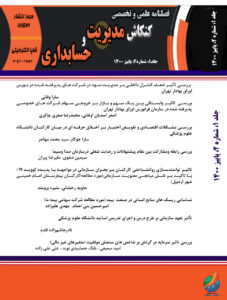مقاله: پژوهشی
صفحه: 82- 101
نویسندگان:
خدیجه میرزائی[1]
[1] گروه مدیریت، موسسه اموزش عالی شمیم دانش نوین، اردبیل، ایران.
چکیده
اين تحقيق به بررسي تاثیر بانکداری الکترونیک بر کیفیت خدمات ادراکشده و رضایت مشتریان در دوران همهگیری ویروس کووید 19 پرداخته است. تحقيق حاضر ازنظر هدف کاربردي واز نظر گردآوري دادهها، توصيفي از نوع همبستگي ميباشد. جامعه آماري این تحقیق کليه مشتریان شعب بانک مسکن شهر اردبیل در نیمه دوم سال 1400 بودند که تجربه استفاده از خدمات الکترونيک اين بانک را داشتهاند که به روش نمونهگیری تصادفی ساده و بر اساس روش کوکران جامعه نامحدود تعداد 384 نفر بهعنوان نمونه آماری انتخاب شدند. با استفاده از پرسشنامههای استاندارد بانکداری الکترونیک (با ضریب آلفای کرونباخ 74/0)، پرسشنامه کیفیت خدمات ادراکشده (با ضریب آلفای کرونباخ 76/0) و پرسشنامه رضایت مشتری (با ضریب آلفای کرونباخ 88/0) اطلاعات تحقيق گردآوري شد. در اين تحقيق از روشهای آمار توصيفي – استنباطي براي تجزیهوتحلیل دادهها استفاده شده است. در سطح تجزیهوتحلیل توصيفي به تجزیهوتحلیل دادههاي جمعيت شناختي و در سطح تجزیهوتحلیل استنباطي با استفاده از آزمون رگرسیون تک متغیره به تجزیهوتحلیل دادهها جهت تاييد و يا رد فرضیههای تحقيق پرداخته شد. نتايج به دست آمده از اين تحقيق نشان داد که بانکداری الکترونیک 27 درصد تغييرات کیفیت خدمات ادراکشده و 24 درصد از تغييرات رضایت مشتری را در دوران همهگیری ویروس کووید 19 پیشبینی ميكند.
کلمات کلیدی: بانکداری الکترونیک، کیفیت خدمات ادراکشده، رضایت مشتریان، ویروس کووید 19
Investigating the effect of electronic banking on perceived service quality and customer satisfaction during the Covid-19 pandemic
This research has investigated the impact of electronic banking on perceived service quality and customer satisfaction during the Covid-19 pandemic. The current research is descriptive of the correlation type in terms of practical purpose and data collection. The statistical population of this research was all the customers of Maskan Bank branches in Ardabil city in the second half of 1400 who had the experience of using the electronic services of this bank. 384 people were selected as a statistical sample by simple random sampling and based on Cochran’s unlimited population method. Using standard electronic banking questionnaires (with Cronbach’s alpha coefficient of 0.74), perceived service quality questionnaire (with Cronbach’s alpha coefficient of 0.76) and customer satisfaction questionnaire (with Cronbach’s alpha coefficient of 0.88), research information was collected. In this research, descriptive-inferential statistics methods have been used for data analysis. At the level of descriptive analysis, demographic data was analyzed and at the level of inferential analysis, using univariate regression test, the data was analyzed to confirm or reject the research hypotheses. The results obtained from this research showed that electronic banking predicts 27% of perceived service quality changes and 24% of customer satisfaction changes during the Covid-19 pandemic.
Keywords: electronic banking, perceived service quality, customer satisfaction, Covid-19 virus
